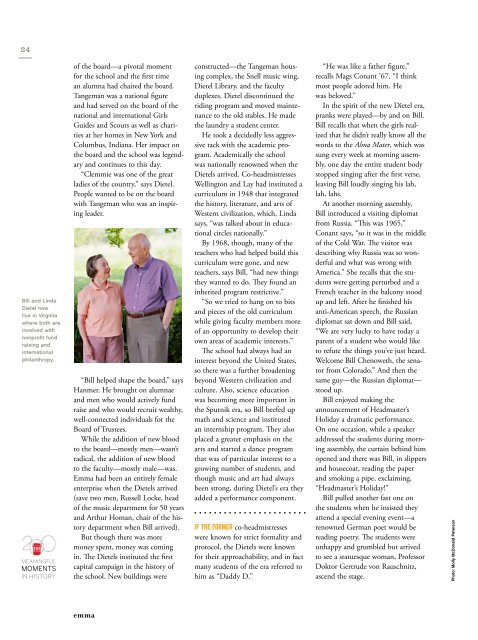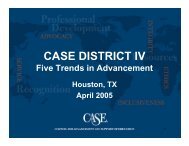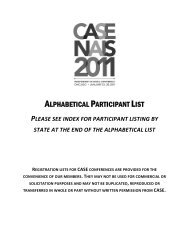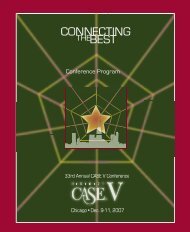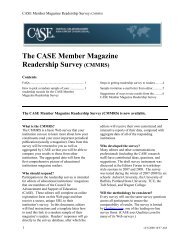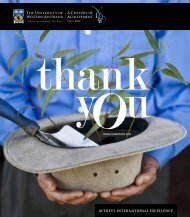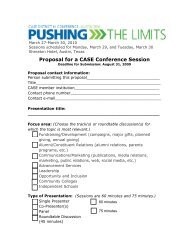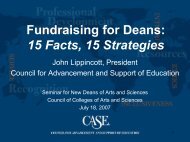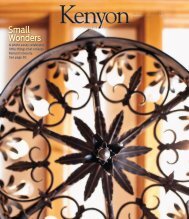Emma Magazine - CASE
Emma Magazine - CASE
Emma Magazine - CASE
- No tags were found...
You also want an ePaper? Increase the reach of your titles
YUMPU automatically turns print PDFs into web optimized ePapers that Google loves.
24Bill and LindaDietel nowlive in Virginiawhere both areinvolved withnonprofit fundraising andinternationalphilanthropy.meaningfulmomentsin historyof the board—a pivotal momentfor the school and the first timean alumna had chaired the board.Tangeman was a national figureand had served on the board of thenational and international GirlsGuides and Scouts as well as charitiesat her homes in New York andColumbus, Indiana. Her impact onthe board and the school was legendaryand continues to this day.“Clemmie was one of the greatladies of the country,” says Dietel.People wanted to be on the boardwith Tangeman who was an inspiringleader.“Bill helped shape the board,” saysHanmer. He brought on alumnaeand men who would actively fundraise and who would recruit wealthy,well-connected individuals for theBoard of Trustees.While the addition of new bloodto the board—mostly men—wasn’tradical, the addition of new bloodto the faculty—mostly male—was.<strong>Emma</strong> had been an entirely femaleenterprise when the Dietels arrived(save two men, Russell Locke, headof the music department for 50 yearsand Arthur Homan, chair of the historydepartment when Bill arrived).But though there was moremoney spent, money was comingin. The Dietels instituted the firstcapital campaign in the history ofthe school. New buildings wereconstructed—the Tangeman housingcomplex, the Snell music wing,Dietel Library, and the facultyduplexes. Dietel discontinued theriding program and moved maintenanceto the old stables. He madethe laundry a student center.He took a decidedly less aggressivetack with the academic program.Academically the schoolwas nationally renowned when theDietels arrived. Co-headmistressesWellington and Lay had instituted acurriculum in 1948 that integratedthe history, literature, and arts ofWestern civilization, which, Lindasays, “was talked about in educationalcircles nationally.”By 1968, though, many of theteachers who had helped build thiscurriculum were gone, and newteachers, says Bill, “had new thingsthey wanted to do. They found aninherited program restrictive.”“So we tried to hang on to bitsand pieces of the old curriculumwhile giving faculty members moreof an opportunity to develop theirown areas of academic interests.”The school had always had aninterest beyond the United States,so there was a further broadeningbeyond Western civilization andculture. Also, science educationwas becoming more important inthe Sputnik era, so Bill beefed upmath and science and institutedan internship program. They alsoplaced a greater emphasis on thearts and started a dance programthat was of particular interest to agrowing number of students, andthough music and art had alwaysbeen strong, during Dietel’s era theyadded a performance component.If the former co-headmistresseswere known for strict formality andprotocol, the Dietels were knownfor their approachability, and in factmany students of the era referred tohim as “Daddy D.”“He was like a father figure,”recalls Mags Conant ’67. “I thinkmost people adored him. Hewas beloved.”In the spirit of the new Dietel era,pranks were played—by and on Bill.Bill recalls that when the girls realizedthat he didn’t really know all thewords to the Alma Mater, which wassung every week at morning assembly,one day the entire student bodystopped singing after the first verse,leaving Bill loudly singing his lah,lah, lahs.At another morning assembly,Bill introduced a visiting diplomatfrom Russia. “This was 1965,”Conant says, “so it was in the middleof the Cold War. The visitor wasdescribing why Russia was so wonderfuland what was wrong withAmerica.” She recalls that the studentswere getting perturbed and aFrench teacher in the balcony stoodup and left. After he finished hisanti-American speech, the Russiandiplomat sat down and Bill said,“We are very lucky to have today aparent of a student who would liketo refute the things you’ve just heard.Welcome Bill Chenoweth, the senatorfrom Colorado.” And then thesame guy—the Russian diplomat—stood up.Bill enjoyed making theannouncement of Headmaster’sHoliday a dramatic performance.On one occasion, while a speakeraddressed the students during morningassembly, the curtain behind himopened and there was Bill, in slippersand housecoat, reading the paperand smoking a pipe, exclaiming,“Headmaster’s Holiday!”Bill pulled another fast one onthe students when he insisted theyattend a special evening event—arenowned German poet would bereading poetry. The students wereunhappy and grumbled but arrivedto see a statuesque woman, ProfessorDoktor Gertrude von Rauschnitz,ascend the stage.Photo: Molly McDonald Petersonemma


